WHO and its many partners regularly deploy mobile clinics and medical teams to reach people cut off from access to health services. For many people access to these mobile clinics and teams may be their only source of health care.
Mobile clinics offer flexible and viable options for treating isolated and vulnerable groups as well as to newly displaced populations. When coordinating crisis response, WHO arranges for mobile health care teams to go by foot, bike, moto, boat or vehicle.
The demand for mobile units keeps rising. WHO may buy mobile clinics or supply them, or pay for partners to buy or supply them.
For example, last year WHO provided 44 mobile clinics to Syrian health non-governmental organizations to serve populations in hard-to-reach areas.
Below are series of photos illustrating some of the ways WHO uses mobile clinics and medical teams in emergencies.

An inside look in the back of a WHO-supported mobile clinic deployed in the Syrian Arab Republic.
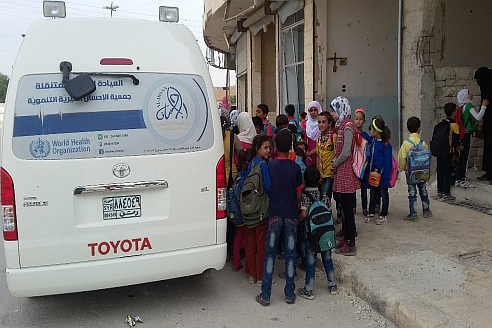
Syrian children line up at a WHO-supported mobile clinic in western Aleppo. With the introduction of the mobile clinics and in partnership with nongovernmental organizations, WHO has provided humanitarian health support to the under-served populations. This includes areas where the health care system has been adversely affected by the crisis especially Dar’a, Aleppo, Rural Damascus, Al Hassakeh and Deir ez-Zor among others.
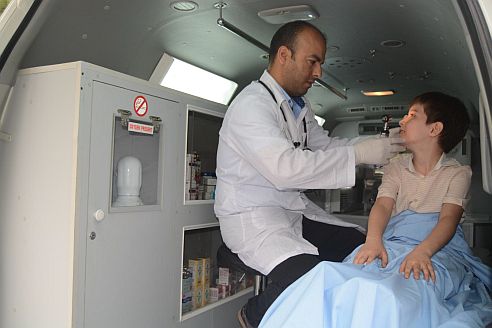
A health worker for Al Ihasan Charity and Development Association, one of the local nongovernmental organizations providing support from WHO’s mobile clinics, treats a young patient.

A young student receives his first oral cholera vaccination dose from WHO's Dr Salahuddin Hussein, a medical officer working in Dohuk Governate, Iraq.

This WHO-supported mobile clinic in Ukraine shows one of the many ways a mobile clinic may look worldwide.
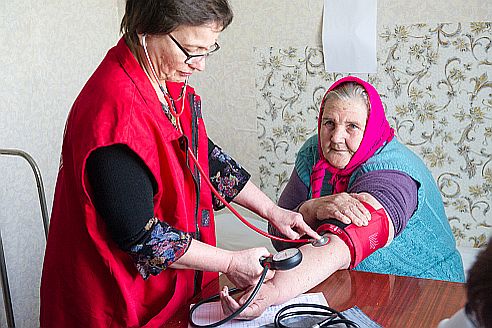
People wait for a doctor’s consultation in front of an old building that functions as a primary health care facility in Synykha village, Ukraine. Halyna, 70, cries. She has heart disease, but it is almost impossible for her to visit a doctor.
“The clinic is 30 km away, the bus runs only once a day, but even in town there is no cardiologist to consult with,” Halyna said. “I cannot afford medicines. We have not received proper health care for more than two years since the conflict started. Without the support provided by the mobile team, I cannot imagine how I would survive.”
To address the needs of the population affected by the conflict in Ukraine and internally displaced persons, WHO has established mobile primary health care units in six regions in eastern Ukraine. The units are operated by Health Cluster partners, such as Ukrainian Red Cross and the Hippocrates Greek Medical Foundation.
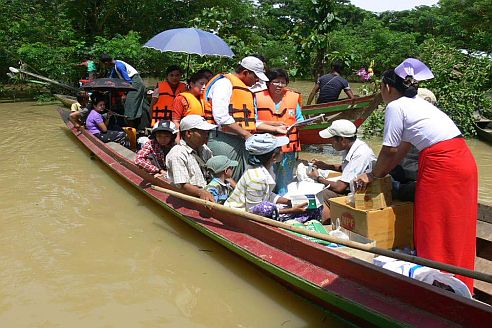
In the midst of widespread flooding in Myanmar after Cyclone Komen in August 2015, the mountainous region of Myanmar’s Chin state was hit by severe landslides, and in Rakhine state numerous villages could not be reached by vehicle.
Staff of WHO’s Myanmar Country Office did not let tough access conditions deter their efforts to reach affected populations of Rakhine state. Mobile medical teams often could not find areas dry enough to set up temporary facilities. The decision was made to use shallow-draft boats, with doctors, nurses (wearing their traditional distinctive red skirts), and health assistants delivering clinical care and medicines while floating on the slowly receding flood waters.
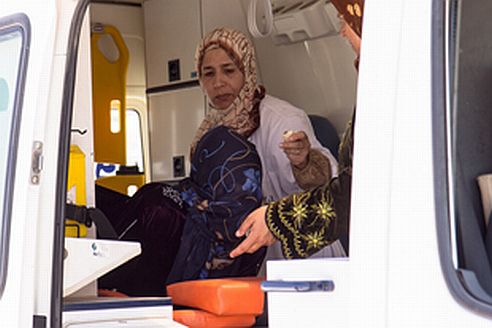
Rahab Al Jamal is one of 17 midwives working in the Zaatari refugee camp in Jordan, where 100 to 200 women each day, most of them refugees from the Syrian civil war, go into labour under less-than-optimum circumstances. “We have to support mothers during delivery in extremely hard conditions,” she reports. Ms. Al Jamal also provides consultations on family planning methods and offers pre- and post-natal care to women at the camp.
